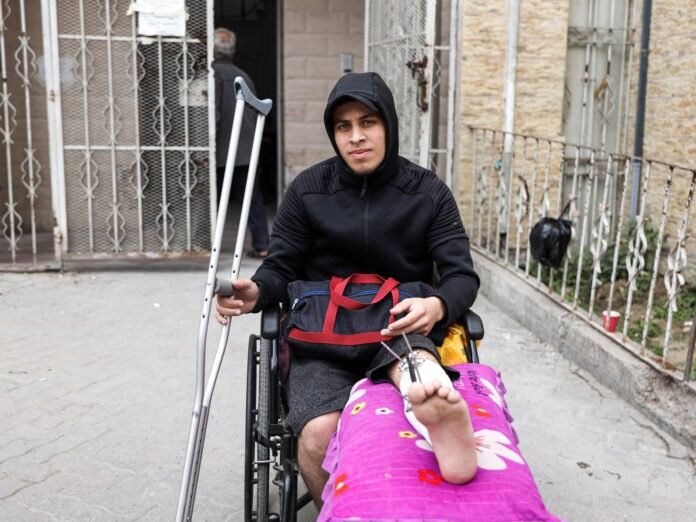Gaza City, Gaza – Yousef Abu Sakran was dozing next to his injured child and wife, Iman, in a tent ward at al-Ahli Arab Hospital when the sounds of people running and shouting woke him up.
He stepped into the hospital courtyard well before dawn on Sunday to ask what was happening but found no clear answer, only vague news that the Israeli army had made calls to people living around the hospital, demanding the expulsion of everyone in the medical facility.
The 29-year-old father reacted instantly. He scooped up his five-year-old son, Mohammad, and he and Iman ran towards the gate.
Mohammad has severe injuries across his body, including third-degree burns on his back and legs, but Yousef had to keep running with him.
“I was carrying my son, whose body was burned, and running while he screamed,” Yousef said. “His back was bleeding – his wounds were bleeding heavily – and he was screaming in agony.
“[So many people’s] injuries reopened from the sudden movement. I saw the family of a girl with spinal injuries trying to pull her bed, but it was stuck in the debris.
“Just seconds after we left the hospital, it was struck by two missiles that shook the entire place. I told my wife: ‘Imagine if we had been a minute later. We’d be dead.’”
Yousef and his wife were in the street with everyone else from the hospital.
An hour after the hospital was bombed, Yousef and his wife decided there was nothing they could do other than take Mohammad back to al-Ahli.
“The place was pitch-black, and it reeked of gunpowder and dust. I went to the surgery building at the far end of the hospital, where I found a nurse who took pity on Mohammad’s condition, treated his wounds and admitted him.”
Bombing a hospital like this, Yousef said, is a stain on humanity’s conscience.
“They bomb our homes over our heads and then bomb hospitals while patients and the wounded are inside. Where are we supposed to go?
“Isn’t all this grief and suffering enough?”
Where to go with an injured boy?
He was shot in the leg by Israeli tanks, damaging his bones and tissue to the point that he needed metal implants and has been in the orthopaedic department since then.
“My brother, who usually stays with me, wasn’t there. I don’t even know how I managed to stand on my injured leg, grab my crutches and flee,” Suhaib told media as he exited the surgery department after having the wounds to his leg cleaned and checked.
“I forgot my pain because of what I saw around me. Everyone was screaming in terror and fear, just trying to survive. It felt like the Day of Judgement.”
Suhaib also managed to get out of the hospital minutes before two Israeli missiles landed.
“My leg couldn’t handle it any more, and my wound reopened and started bleeding again.”
He couldn’t keep walking, so he stopped and called his brother, who came and supported him to their home in the Zeitoun neighbourhood, a half-hour’s walk for a healthy person on undamaged roads.
The pain in his leg kept Suhaib up, but he was also worried about the hospital being forced to close.
“I’ve been staying in the hospital [for more than a year] because of my condition,” he said. Suhaib has a medical referral to travel outside Gaza for treatment but has been waiting to leave for a year.
“Isn’t the closure and banning of our travel enough? They even target the hospital that was still treating us with the little that’s available.”
The Israeli strike on al-Ahli has exacerbated an already catastrophic situation for Gaza’s healthcare system, which has been collapsing as Israeli bombardments and a blockade on medicines, medical supplies and fuel continues.
In the panic that ensued because Israel did not give hospital staff even the bare minimum of time to evacuate patients, a child died due to lack of oxygen, Fadel Naeem, director of al-Ahli, told media.

